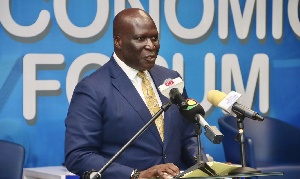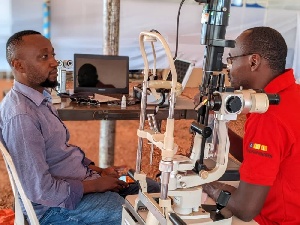- Home - News
- Elections 2024
- News Archive
- Crime & Punishment
- Politics
- Regional
- Editorial
- Health
- Ghanaians Abroad
- Tabloid
- Africa
- Religion
- Photo Archives
- Press Release
General News of Friday, 30 May 2025
Source: www.ghanawebbers.com
BoG urges deep structural reforms for economic reset
The Bank of Ghana (BoG) has emphasized that macroeconomic stability alone cannot reset Ghana’s economy. Bold reforms are needed to tackle long-standing structural challenges.
This statement comes after recent improvements in the economy. The Cedi has appreciated by about 18 percent against the US Dollar since early 2025. This appreciation has contributed to better economic indicators.
At the Daily Graphic/Ecobank Economic Forum in Accra, Mr. Osei Gyasi, a BoG Director, stressed the need for long-term reforms. He stated that while macroeconomic stability is necessary, it is not enough for a full economic reset.
Mr. Gyasi explained that stability strengthens economic fundamentals. However, structural transformation is essential for sustainable and inclusive growth.
The government’s economic reset agenda aims to boost productivity and governance. It seeks to create jobs, promote accountability, and ensure prosperity through fiscal stability and debt sustainability.
He called for a diversified growth model that adds value to Ghana's resources. Enhanced intra-African trade should also be prioritized.
Gold and cocoa are important for recovery but have limitations. The country needs to build on these sectors with value addition and diversification for long-term prosperity.
Mr. Gyasi urged leveraging the African Continental Free Trade Area (AfCFTA). This would help position Ghana as a regional hub for agro-processing, light manufacturing, and logistics.
He also highlighted the importance of tourism, education, and health sectors. Targeted policy interventions and infrastructure investments are crucial in these areas.
Addressing deep structural constraints is necessary along with institutional reforms.
On revenue generation, Mr. Gyasi suggested broadening domestic mobilization through better tax compliance and efficiency. He recommended performance-based budgeting and stronger public financial management systems.
“The economic reset agenda involves policy consistency and institutional reforms,” he said. If done right, Ghana can transition from resilience to transformation.
He reaffirmed the Central Bank’s commitment to prudent monetary policies aimed at stabilizing the economy. This supports Ghana's goal of becoming stable and globally competitive.
Mr. Seth Terkper, Presidential Advisor on the Economy, echoed calls for structural reforms. He noted that the current policy framework lags behind necessary economic transformations as services dominate the economy.
He expressed concern over agriculture's decline relative to services. The government aims to reverse this trend through private sector collaboration for value addition and diversification.
Mr. Terkper added that strengthening domestic taxation is a priority too. The goal is to raise the tax-to-GDP ratio between 18% and 20%.
“As President stated, borrowing should fund projects that can repay loans,” he said.











